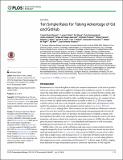Ten Simple Rules for Taking Advantage of Git and GitHub
Author(s)
Perez-Riverol, Yasset; Gatto, Laurent; Wang, Rui; Sachsenberg, Timo; Uszkoreit, Julian; Leprevost, Felipe da Veiga; Fufezan, Christian; Ternent, Tobias; Eglen, Stephen J.; Katz, Daniel S.; Konovalov, Alexander; Flight, Robert M.; Blin, Kai; Vizcaíno, Juan Antonio; Pollard, Tom Joseph; ... Show more Show less
DownloadPerez-Riverol-2016-Ten Simple Rules for.pdf (599.9Kb)
PUBLISHER_CC
Publisher with Creative Commons License
Creative Commons Attribution
Terms of use
Metadata
Show full item recordAbstract
Bioinformatics is a broad discipline in which one common denominator is the need to produce and/or use software that can be applied to biological data in different contexts. To enable and ensure the replicability and traceability of scientific claims, it is essential that the scientific publication, the corresponding datasets, and the data analysis are made publicly available. All software used for the analysis should be either carefully documented (e.g., for commercial software) or, better yet, openly shared and directly accessible to others. The rise of openly available software and source code alongside concomitant collaborative development is facilitated
by the existence of several code repository services such as SourceForge, Bitbucket, GitLab, and GitHub, among others. These resources are also essential for collaborative software projects because they enable the organization and sharing of programming tasks between different
remote contributors. Here, we introduce the main features of GitHub, a popular webbased platform that offers a free and integrated environment for hosting the source code, documentation, and project-related web content for open-source projects. GitHub also offers paid plans for private repositories (see Box 1) for individuals and businesses as well as free plans
including private repositories for research and educational use.
Date issued
2014-07Department
Massachusetts Institute of Technology. Institute for Medical Engineering & Science; Harvard University--MIT Division of Health Sciences and Technology; Harvard--MIT Program in Health Sciences and Technology. Laboratory for Computational PhysiologyJournal
PLOS Computational Biology
Publisher
Public Library of Science
Citation
Perez-Riverol, Yasset et al. “Ten Simple Rules for Taking Advantage of Git and GitHub.” Ed. Scott Markel. PLOS Computational Biology 12.7 (2016): e1004947.
Version: Final published version
ISSN
1553-7358
1553-734X